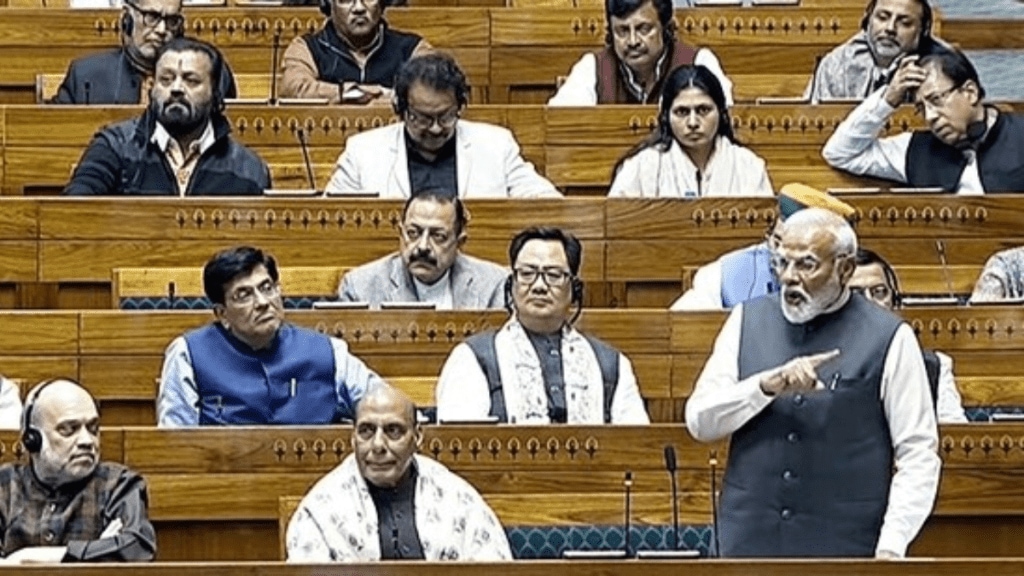Prime Minister Narendra Modi, on Thursday, responded to the discussion in the Rajya Sabha on the Motion of Thanks on the President’s Address, strongly criticising Congress while championing his party’s governance model.
In his address, PM Modi targeted the Congress party, accusing it of promoting a model of politics founded on “lies, fraud, corruption, nepotism, and appeasement.” He further remarked, “Where there is a blend of all these things, there can be no ‘Sabka Sath Sabka Vikas.’ The supreme in Congress’ model is ‘family first’, and that is why their policies and tone have always been focused on managing that.”
PM Modi contrasted Congress’ approach with the development-oriented model of governance introduced after 2014. He emphasised that the BJP’s model focuses on “satisfaction” rather than appeasement, a sharp departure from the Congress-era policies, which he claimed were based on appeasing certain groups.
“After 2014, India saw a new model of working style, one that prioritizes ‘nation first,’ unlike the Congress model,” PM Modi said. He outlined the BJP’s commitment to optimally utilising resources for the welfare of the people and safeguarding the rights of marginalized communities. “We strengthened SC, ST laws to ensure the protection of rights for Dalits and oppressed communities,” he added.
On social harmony, PM Modi remarked that attempts to spread caste poison in society were now being made by those with ulterior motives. He pointed to the BJP’s significant decision to give constitutional status to the OBC Panel, a demand long ignored by previous Congress governments.
Reflecting on the Congress government’s past, PM Modi also noted that Congress had never conferred Bharat Ratna to B. R. Ambedkar, adding that they had made efforts to defeat him twice in Lok Sabha elections. “Today, Congress is forced to say ‘Jai Bhim,’” Modi remarked, underscoring the BJP’s commitment to Dr. Ambedkar’s legacy.
PM Modi also addressed the BJP’s focus on skill development, financial inclusion, and industrialization, highlighting programs like the PM Mudra Scheme, which aims to realise Dr. Ambedkar’s vision. “Welfare of the poor and deprived is our priority; our government worships those ignored by others,” he declared.
The Prime Minister also defended the government’s 10% reservation for economically weaker sections (EWS) in the general category, reiterating the BJP’s commitment to providing opportunities for all.
Shifting to economic issues, PM Modi lashed out at Congress for the “licence permit raj” it had implemented, which he said stifled India’s economic growth. He contrasted this with the current regime’s focus on infrastructure development, which he believes is key to transforming India from a developing nation to a developed one.
Further highlighting the BJP’s initiatives, PM Modi shared the government’s success in bolstering the sports ecosystem through schemes like the Target Olympic Podium Scheme and Khelo India, which have seen Indian athletes, including women, excel on the global stage.
The Prime Minister also underscored the importance of education reforms, citing the New Education Policy, which includes provisions for education in mother tongues and aims to enhance the country’s future workforce.
PM Modi concluded by addressing the completion of long-delayed infrastructure projects, such as the Udhampur-Srinagar-Baramulla railway line in Jammu and Kashmir, which will be completed in 2025, after being approved in 1994.
With these remarks, PM Modi’s speech captured the essence of the BJP’s vision for India’s future while sharply contrasting it with Congress’ historical governance, thus reiterating his call for a continued mandate for his party’s policies.


